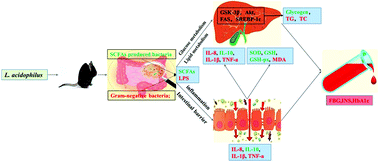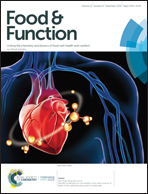Lactobacillus acidophilus alleviates type 2 diabetes by regulating hepatic glucose, lipid metabolism and gut microbiota in mice†
Abstract
Diabetes, an endocrine and metabolic disorder, has become the third most non-infectious chronic disease that threatens human health. Type 2 diabetes (T2D) accounts for more than 90% of diabetic patients, mainly caused by environmental factors. Lactic acid bacteria (LAB) exhibit several health benefits to the host including regulating glucose and lipid metabolism and improving oxidative stress and inflammatory response. However, the anti-diabetic mechanism of probiotics has not been elucidated clearly. In this study, the anti-diabetic effects of Lactobacillus acidophilus KLDS1.1003 and KLDS1.0901 on T2D mice were assessed. Oral administration of L. acidophilus KLDS1.1003 and KLDS1.0901 for 6 weeks significantly improved the epithelial barrier function, which in turn lowered inflammation cytokines, including IL-8, TNF-α and IL-1β in liver and colon tissue, and prevented liver and colon tissue injuries to some extent. Additionally, L. acidophilus treatment regulated the expression genes that are related to glucose and lipid metabolism. The two tested strains down-regulated the expression of glycogen synthase kinase 3β (GSK-3β), fatty acid synthase (FAS) and sterol regulatory element-binding transcription factor 1c (SREBP-1c), and up-regulated the expression of protein kinase B (Akt). However, L. acidophilus KLDS1.0901 is better for improving T2D than L. acidophilus KLDS1.1003. Further research showed that L. acidophilus KLDS1.0901 supplementation could reshape gut microbiota, increasing short chain fatty acid-producing bacteria (Blautia, Roseburia and Anaerotruncus) and the level of SCFAs and decreasing the relative abundance of Gram-negative bacteria such as Desulfovibrio, Alistipes and Bacteroides. Notably, L. acidophilus KLDS1.0901 treatment restored the structure of gut microbiota similar to the control group. These findings suggested that L. acidophilus KLDS1.0901 might be used as a new type of antidiabetic drug candidate.



 Please wait while we load your content...
Please wait while we load your content...